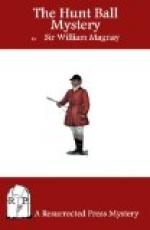“The locked door—” Morriston suggested.
“The locked door,” said Major Freeman, “presents a difficulty, but still one not absolutely incapable of solution. We know,” he added, with a faint smile, “from the way the door was eventually opened, that a key can be turned from the other side, given the right instrument to effect it.”
“Which only a burglar or a locksmith would be likely to have,” Kelson suggested.
Major Freeman nodded. “Quite so. I am not for a moment suggesting that as an explanation of the mystery. It goes naturally much deeper than that. Mr. Gervase Henshaw is to look into his brother’s affairs and papers while in town, and I am hoping that on his return here he may be able to give some information which will afford a clue on which we can work. In the meantime my men are not relaxing their efforts in this rather baffling case.”
“In which,” Morriston suggested, “this new piece of evidence does not afford any useful clue.”
Major Freeman smiled, a little awkwardly, it seemed. “If anything, it would appear to complicate the problem still further,” he replied guardedly. “Still, I am very glad to have it, and thank you for informing me so promptly. Miss Tredworth may rest assured that should we find it necessary to go still farther into this piece of evidence, it will be done with as little annoyance as possible.”
Some of the chief constable’s habitual sternness of manner seemed to have returned to him as he now rose to take leave. “I will just confer with my men who are on the premises before I leave,” he said to Morriston in a quiet authoritative tone. “They may have something to report.” With that he bowed to the company and quitted the room, leaving behind him a rather uncomfortable feeling which every one seemed to make an effort to throw off.
But there was clearly nothing to be done except to let the police researches take their course and to wait for developments. The party at Wynford was going over to the dance at Stowgrave that evening and it was arranged that they would call for Kelson and Gifford and all go on together.
Accordingly at the appointed time the carriage stopped at the Golden Lion; Kelson joining Miss Tredworth and her brother, while Gifford drove with Morriston.
In answer to his companion’s inquiry Morriston said that he had heard of nothing fresh in the Henshaw case.
“I saw Major Freeman for a moment as he was leaving,” he said, “and gathered that the police were still at a loss for any satisfactory explanation as to how the crime was committed.”
“He made no suggestion as to the stains on Miss Tredworth’s dress?” Gifford asked.
“No. Although I fancy he is a good deal exercised by that piece of evidence. Mentioned, as delicately as possible, that it might be necessary to have the stains analyzed, but did not wish the girl to be alarmed or worried about it. I can’t understand,” Morriston added in a puzzled tone, “how on earth she could possibly have had anything to do with it.”




